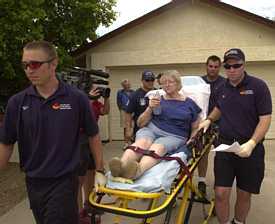| By Dennis Godfrey
Aug. 30, 2002
Her house was sold at a sheriff's auction for $52,500 to Armando Hernandez. The house was a disaster. She had 15 cats. Boxes and clutter filled almost every inch. Appliances did not work. Charlie Bindert learned of the eviction from television news. He immediately started scrambling to find a way to help, although he had never met Brown. She now lives in his house. No person of any official position has made any attempt to check on Brown, he said. None helped in cleaning up the house. "As far as anyone who had some power, who could have done something, who had a lot more influence that we had, no one has come forth at all," he said. Bindert, Pat Haruff and Lori Hubbard, none of whom knew each other or Brown, came together to take care of Brown and her belongings. What government did, in the form of her homeowners association and the courts, was take away her house. Ken Forgia, a Peoria councilman who lives in Westbrook Village, said he did as much for Brown as he could. "I don't think government let Marie Brown down. I think Marie Brown let Marie Brown down," he said. "It's really funny how the news media has responded, making everyone involved a villain except Marie Brown. She is a very, very defiant woman." John Keegan, Peoria's mayor, would not talk about Brown's situation. Given similar circumstances, the Westbrook Village HOA would act exactly as it did with Brown, President Patrick Hickson said. "Given the same situation - and most folks don't know all that went on - given the obstinate approach, yes," he said. Forgia, who served as a sounding board for Brown, considers her a friend. He said he advised her in almost every phone call, which came sometimes twice a day, to get an attorney. "I don't believe I let her down a bit. I tried to help her by telling her what I thought she needed to do. . . . You got to know her. You can't go in there and force her to do anything," he said. Adult Protective Services had no authority to force her into anything, said Tina Dannenfelser, the agency's operations manager. She would not speak about what services were offered Brown. "In Arizona, freedom comes before safety," Dannenfelser said. That means that unless someone can show abuse, neglect or exploitation, Adult Protective Services can only offer help. "People refuse services, so it looks like we're not doing our job," Dannenfelser said. Scott Bundgaard, who represented Brown as a state senator, said his office tried to help after he learned of the eviction. He had his office call the Arizona Health Care Cost Containment System, the state's Medicaid program for the indigent. "Everything the government could do was after the fact," he said. He said his office looked into the matter and found there wasn't anything it could do. Bundgaard praised the volunteers who are trying to make Brown comfortable. "(They) have done what more neighbors should be doing in cases like this," he said. "I'm glad they did it without government intervention." Haruff, who is an activist in homeowner association issues, said she agrees that government is not the answer. "We need to take care of ourselves and not ask somebody else to do it," she said. In Brown's case, government did not need to be involved if people had paid more attention to her and had been willing to help, she said. Government has no role in dealing with Brown now, Haruff said. "Absolutely not. I do not think she needs government help. . . . Marie actually is probably better off than when she was in that house." |



